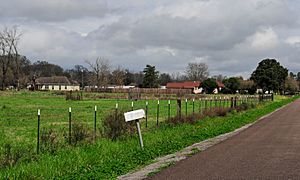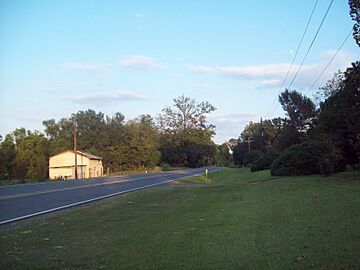Lakeland, Louisiana facts for kids
Quick facts for kids
Lakeland
|
|
|---|---|
|
village
|
|
 |
|
| Country | United States |
| State | Louisiana |
| Parish | Pointe Coupee |
| Elevation | 30 ft (9 m) |
| Time zone | UTC-6 (CST) |
| • Summer (DST) | UTC-5 (CDT) |
| ZIP code |
70752
|
| Area code(s) | 225 |
| GNIS feature ID | 543376 |
| FIPS code | 22-077 |
Lakeland is a small village in southeastern Pointe Coupee Parish, Louisiana, United States. Its name in French is Terre-du-Lac. This area is known for its historic plantation homes, like Alma and Poydras Plantations.
Contents
Exploring Lakeland's Location and History
Lakeland is found along False River, in the southeastern part of Pointe Coupee Parish. It is about 6 miles south of New Roads. In the 1800s, Lakeland was a "post-village," meaning it had a post office. It was also served by a railway station called Abramson, which is no longer there. At that time, Lakeland had a church, four stores, and several places that processed cotton and sugar.
Lakeland's Unofficial Borders
Lakeland does not have official boundaries, but people generally consider the area to be bordered by certain roads. These include Louisiana Highway 416 to the north, Louisiana Highway 983 to the east, Louisiana Highway 1 to the west, and U.S. Highway 190 to the south. Within this area, you can find the Immaculate Conception Catholic Church and the Alma Plantation Sugar Mill. The first post office in Lakeland opened in 1878.
The Story of Alma Plantation
Julien de Lallande Poydras was a famous poet, plantation owner, and generous person in Louisiana. In 1789, he bought land in Lakeland and called it Poydras' plantation. He built a large home there, which he named Poydras Bayou. He owned four plantations in the Lakeland area and two more in West Baton Rouge Parish. The plantations in Pointe Coupee grew cotton and sugarcane, which were then sent to New Orleans for sale.
A Historical Event at Poydras' Plantations
On May 4, 1795, a significant event known as the Pointe Coupée slave conspiracy took place on other nearby Poydras plantations. This event involved 57 enslaved people and three white planters who faced public trial. The situation began when a controversial book, Theorie de l'impot, was found in one of the slave cabins. This book was written by Count of Mirabeau, a leader of the French Revolution, and contained ideas from the Declaration of the Rights of Man and of the Citizen. Enslaved people were not allowed to have such books. They were accused of trying to organize and harm their masters. After the trial, 23 enslaved people were executed, and 31 others were punished with hard labor. The three white planters were sent away to Havana.
Famous Visitors to Alma Plantation
Julien Poydras often welcomed guests to his plantations. Some records say that in 1798, Prince Louis Philippe I, who later became King of France, and Marigny de Mandeville were guests at his plantations.
Julien Poydras passed away in 1824. His plantation was then sold to David Barrow, who was the brother of Alexander Barrow. David Barrow renamed the plantation Alma, after his daughter. Later, in 1859, George Pitcher became the owner. In 1959, Hampton P. Stewart bought the plantation, and it has stayed in his family for four generations.
Lakeland's Historic Catholic Church
In 1853, one of the first churches in Pointe Coupee Parish was built in the nearby village of Chenal, Louisiana. However, just a few decades later, this church was destroyed by fire. A young priest named Father Louis Savoure, who was 24 years old and from Combourg, decided to rebuild the church in Lakeland. This new church became one of the largest in the parish. By 1882, it had about 2,500 members and was named the Immaculate Conception.
The 1947 Hurricane and Its Impact
In 1947, a very strong hurricane moved inland and passed through Lakeland. Russel L. Honoré, a well-known general, wrote that this hurricane hit Lakeland just four days after he was born. This storm is now called the 1947 Fort Lauderdale hurricane. It caused the deaths of 51 people in Louisiana and led to about $110 million in damages.
Honoré explained that growing up in Lakeland and experiencing such events taught him important survival skills. He believes that his challenging early life in Lakeland helped him gain the abilities needed to lead the Joint Task Force Katrina later in his career.
Education in Lakeland
There is one school in the Lakeland area today: Rougon Elementary School. This school used to be a high school. The community was also home to the Lakeland Elementary School, which is no longer open. That school was located on Louisiana Highway 413, south of Louisiana Highway 416.
Main Roads in Lakeland



